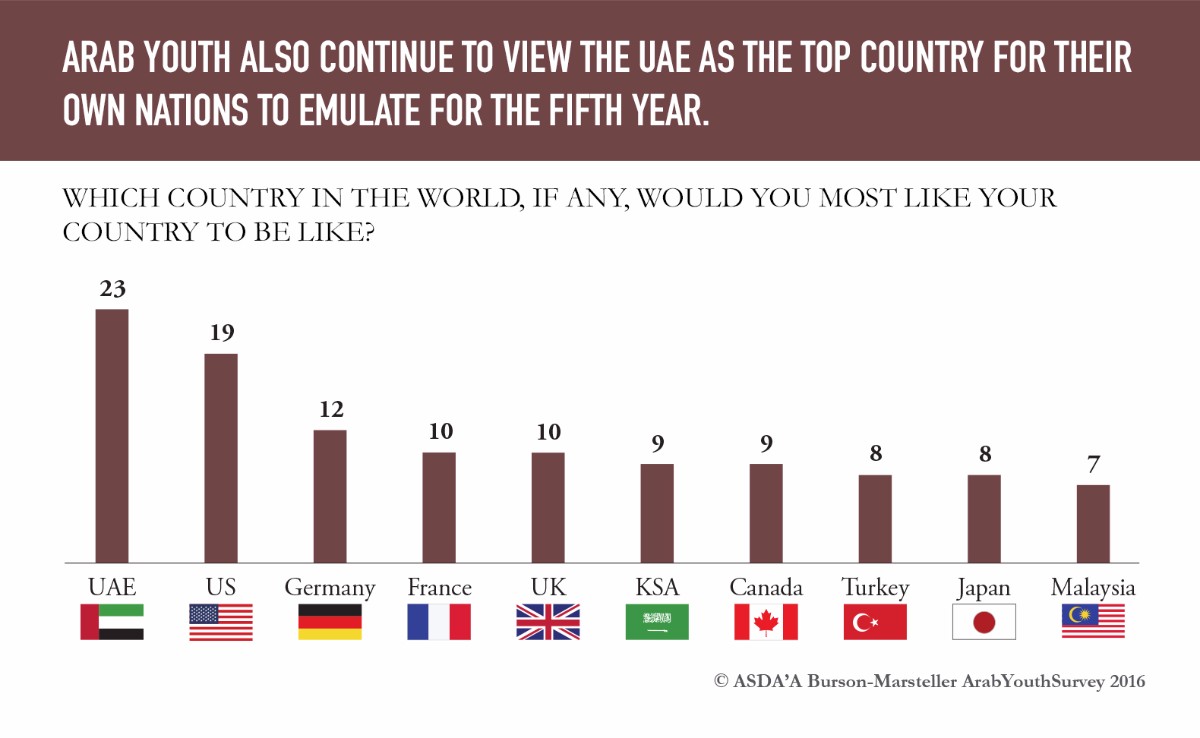 ASDA'A Burson-Marsteller Arab Youth Survey 2016
ASDA'A Burson-Marsteller Arab Youth Survey 2016Posted by Mathew Wallin, April 13, americansecurityproject.org
This week’s release of the 2016 ASDA’A Burson-Marsteller Arab Youth Survey raises a number of concerns about US policy towards the Middle East. Performing 3,500 in-person interviews of men and women between the ages of 18-24 in January and February of this year, the continuing nature of this study is providing one of the few metrics of youth attitudes in the region over an extended period of time. ASP previously held an event discussing the findings of the 2014 Arab Youth Survey.
While there is some promise in the findings, notably that a majority of youth oppose ISIS, there are also a number of very concerning issues with regards to the US role in the region, and how its actions are perceived.
One of the saddest findings, in my personal opinion, is that 93% of Iraqi youth view the United States as an enemy. This does not bode well for future US influence in the country. This demonstrates that despite countless billions of dollars and thousands of lives expended on the effort to give Iraq a stable, prosperous future, US policy in that country has failed in ways that extend beyond ISIS’ initial success. This youth population, which is the generation the US will need to deal with over the next 50 years, is completely distrustful of the US. Considering the amount of activity that the US has conducted in Iraq as these youths have grown up, doing nothing would almost certainly have a more positive effect given this level of negative perception.
The Arab Youth Survey also looked into perceptions about why people are attracted to ISIS. The top 3 reasons respondents gave are: a lack of jobs and opportunities for young people (24%), the belief that ISIS’ interpretation of Islam is correct (18%), and the religious tension between Sunni and Shia (17%). However, as scholar Max Abrahms has pointed out, Muslims who have not joined ISIS may not be the most reliable study group for understanding ISIS’ recruiting success. Either way, it’s worth noting that the biggest “reason” for being attracted to ISIS still garnered only 24% of the respondents, indicating there is no real agreement over what’s the driving factor. More so, it appears there are a mix of factors that have been combined into an effective strategy designed to capture a variety of individuals, and ISIS needs only to recruit a very small percentage of Muslims worldwide to have tens of thousands of soldiers. But even given ISIS’ recruiting success, 25% of respondents were unable to give any reason why someone would want to join. That’s a positive sign.
Another area of concern revealed by the survey is be the issue of rising Iranian influence. For the first time, Iran has placed on the top 10 list of countries that respondents perceived as an ally. Though the US still ranks high on the list, Iran’s ascension is a mostly a result of influence in Iraq, Lebanon, and the Palestinian Territories. Given Iran’s activities in these areas, this should be of no surprise. While there may be little hope for turning around opinion in Iraq at this point, and the Israeli-Palestinian situation is no closer to being solved now than ever, there may be hope for Lebanon. Currently, Lebanon is plagued by governance issues, and strained by the influx of Syrian refugees, but there is room for the US to have a positive impact. Some may perceive the nuclear deal as having strengthened Iran’s hand in the region, and it may have done so in the short term; but the US should be prepared to play the long game of influence in places like Lebanon, where there is much to be gained through public diplomacy and dedicated, well thought out political strategy.
Fortunately, the report indicates that it’s not all bad news for the US, as it generally ranks high in the list of countries youth in the region admire. However, it does show that there is room for improvement. Reports like this should provide the US Government with an opportunity to reassess and make an effort to better understand how including foreign opinions in the policy making process can lead to the creation of more effective policies.
No comments:
Post a Comment